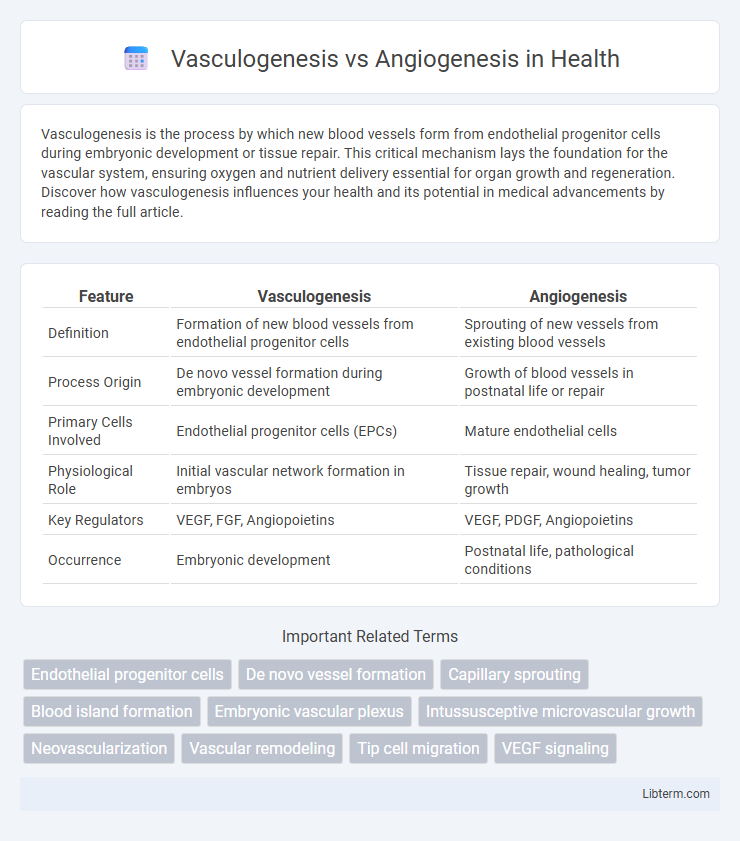Vasculogenesis is the process by which new blood vessels form from endothelial progenitor cells during embryonic development or tissue repair. This critical mechanism lays the foundation for the vascular system, ensuring oxygen and nutrient delivery essential for organ growth and regeneration. Discover how vasculogenesis influences your health and its potential in medical advancements by reading the full article.
Table of Comparison
| Feature | Vasculogenesis | Angiogenesis |
|---|---|---|
| Definition | Formation of new blood vessels from endothelial progenitor cells | Sprouting of new vessels from existing blood vessels |
| Process Origin | De novo vessel formation during embryonic development | Growth of blood vessels in postnatal life or repair |
| Primary Cells Involved | Endothelial progenitor cells (EPCs) | Mature endothelial cells |
| Physiological Role | Initial vascular network formation in embryos | Tissue repair, wound healing, tumor growth |
| Key Regulators | VEGF, FGF, Angiopoietins | VEGF, PDGF, Angiopoietins |
| Occurrence | Embryonic development | Postnatal life, pathological conditions |
Introduction to Blood Vessel Formation
Vasculogenesis refers to the de novo formation of blood vessels from endothelial progenitor cells during embryonic development, establishing the primary vascular network. Angiogenesis involves the sprouting and remodeling of existing blood vessels, contributing to vascular growth and repair in both physiological and pathological conditions. Understanding the distinct molecular mechanisms and cellular processes of vasculogenesis and angiogenesis is crucial for advances in regenerative medicine and cancer therapy.
Defining Vasculogenesis
Vasculogenesis is the process by which new blood vessels form de novo from endothelial progenitor cells, primarily occurring during embryonic development to establish the primary vascular network. Unlike angiogenesis, which involves the sprouting and remodeling of existing vessels, vasculogenesis generates the initial endothelial cell tubes that later mature into functional blood vessels. Understanding vasculogenesis is critical for insights into developmental biology and therapeutic strategies for vascular diseases.
Understanding Angiogenesis
Angiogenesis is the physiological process through which new blood vessels form from pre-existing vessels, playing a crucial role in wound healing and tumor growth. Unlike vasculogenesis, which involves the de novo formation of blood vessels from endothelial progenitor cells during embryonic development, angiogenesis primarily occurs in adults to expand the vascular network. Key factors like vascular endothelial growth factor (VEGF) regulate angiogenesis by stimulating endothelial cell proliferation and migration.
Key Molecular Pathways
Vasculogenesis primarily involves the de novo formation of blood vessels from endothelial progenitor cells and is driven by molecular pathways such as VEGF signaling through VEGFR2, along with Notch signaling and angiopoietin-Tie2 interactions that regulate endothelial cell differentiation and stability. Angiogenesis, the sprouting of new vessels from existing vasculature, heavily relies on VEGF-A/VEGFR2 pathways, matrix metalloproteinases (MMPs) for extracellular matrix remodeling, and the delta-Notch signaling axis to balance endothelial cell proliferation and maturation. Both processes critically depend on hypoxia-inducible factors (HIFs) that modulate these signaling cascades in response to oxygen levels, orchestrating vascular growth and patterning.
Cellular Mechanisms: Comparing Processes
Vasculogenesis initiates blood vessel formation through differentiation of endothelial progenitor cells into new vascular structures during embryonic development, while angiogenesis involves the sprouting and remodeling of existing vessels primarily via endothelial cell proliferation and migration. Cellular signaling pathways such as VEGF and Notch regulate both processes, but vasculogenesis relies heavily on mesodermal precursor cells, whereas angiogenesis depends on mature endothelial cells responding to hypoxic stimuli. The distinct mechanisms reflect their roles in establishing primary vascular networks versus expanding and remodeling vasculature in growth, wound healing, and pathological conditions.
Embryonic Development: Vasculogenesis and Angiogenesis
Vasculogenesis during embryonic development refers to the de novo formation of blood vessels from mesoderm-derived progenitor cells called angioblasts, which differentiate into endothelial cells to establish the primary vascular plexus. Angiogenesis follows vasculogenesis and involves the sprouting and remodeling of existing blood vessels to expand and refine the vascular network necessary for tissue growth and organogenesis. Both processes are tightly regulated by signaling molecules such as VEGF (vascular endothelial growth factor) and play crucial roles in establishing the circulatory system in the embryo.
Postnatal Blood Vessel Growth
Postnatal blood vessel growth primarily involves angiogenesis, the process by which new capillaries sprout from pre-existing vessels through endothelial cell proliferation and migration. Vasculogenesis, the de novo formation of blood vessels from endothelial progenitor cells, is rare after birth but plays a role in tissue repair and neovascularization in ischemic conditions. Key molecular regulators in postnatal angiogenesis include vascular endothelial growth factor (VEGF), angiopoietins, and fibroblast growth factors (FGFs), which coordinate endothelial cell behavior and vessel maturation.
Role in Disease and Tissue Repair
Vasculogenesis primarily occurs during embryonic development by forming new blood vessels from endothelial progenitor cells, playing a crucial role in tissue regeneration and repair after injury. Angiogenesis, the sprouting of new vessels from existing vasculature, is essential in wound healing, cancer progression, and chronic inflammatory diseases. Dysregulated angiogenesis contributes to tumor growth and diabetic retinopathy, whereas impaired vasculogenesis limits effective tissue regeneration in ischemic conditions.
Clinical Applications and Therapeutic Targets
Vasculogenesis, the de novo formation of blood vessels from endothelial progenitor cells, is primarily targeted in regenerative medicine to promote tissue repair and neovascularization in ischemic diseases. Angiogenesis, the sprouting of new vessels from existing vasculature, is a critical focus in cancer therapy where inhibiting vascular endothelial growth factor (VEGF) signaling pathways can suppress tumor growth and metastasis. Therapeutic strategies exploit distinct molecular targets such as VEGF receptors in angiogenesis inhibitors and stem cell-derived endothelial precursors in vasculogenesis-based treatments to optimize clinical outcomes.
Future Perspectives in Vascular Biology
Future perspectives in vascular biology emphasize the integration of vasculogenesis and angiogenesis for therapeutic vascular regeneration, leveraging advances in stem cell technology and biomaterials. Emerging research explores gene editing and molecular signaling pathways to enhance endothelial progenitor cell function and promote vessel formation in ischemic tissues. Innovative imaging techniques and computational modeling are anticipated to improve the understanding of vascular network dynamics, aiding in the development of precision medicine approaches for vascular diseases.
Vasculogenesis Infographic

 libterm.com
libterm.com